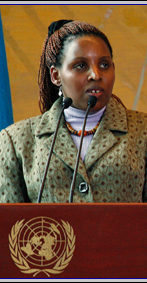Eugenie Mukeshimana

Topics
- The 1994 genocide against Tutsis in Rwanda (personal account)
- Gender role and the Genocide
- The media and the Genocide
- Survivorship: Coping with loss & grief
- Post-genocide Justice, Reconciliation, Faith and Forgiveness
- Managing PTSD among survivors and eye witnesses
- Genocide survivors immigration and resettlement experiences in America
- Genocide Education program development
- Overcoming survivorship: transformation from a survivor to an achiever
- Using your life experience to make a difference
Biography
“It was right after your story that I told myself I would join the STAND chapter at Ramsey. In school, we are not told of the severity of these events — they are merely said as an afterthought and never put in the forefront of our studies. But your story was enlightening (and terribly, terribly saddening). I truly wish to be involved in STAND and other efforts my school organizes to combat genocide, and I owe it all to you and your story.” –Ramsey High School student
“It is truly a transformative experience for the teachers and students who attend, and I can wholeheartedly say that it was a most worthwhile experience for our entire Farmingdale High School community.” — Garner Bass, Director of Social Studies, Farmingdale Public Schools, NY
“I had the privilege to attend the 59th Annual DPI/NGO Conference, UN Headquarters, NYC last fall. One speaker that really impressed me was a 1994 Rwanda genocide survivor, Eugenie Mukeshimana. She spoke of gender-based violence against women in conflict regions and empowerment in the post-conflict period.” — Virginia J. Schlicher, Australia
“You made me realize that life is what you make it, and to live my life the best way I can, Now I see I can change the way I live no matter what I have done, that my life is to be lived happily.” — Marvin C., recovering drug addict